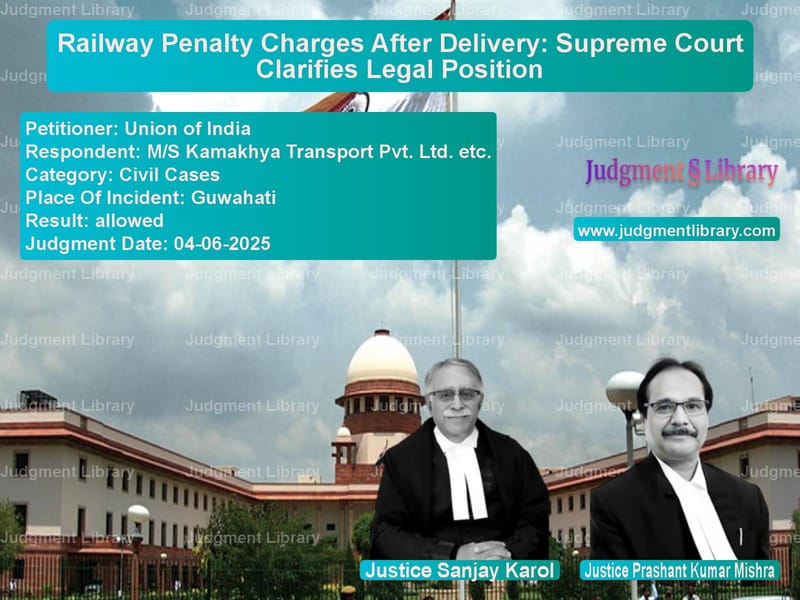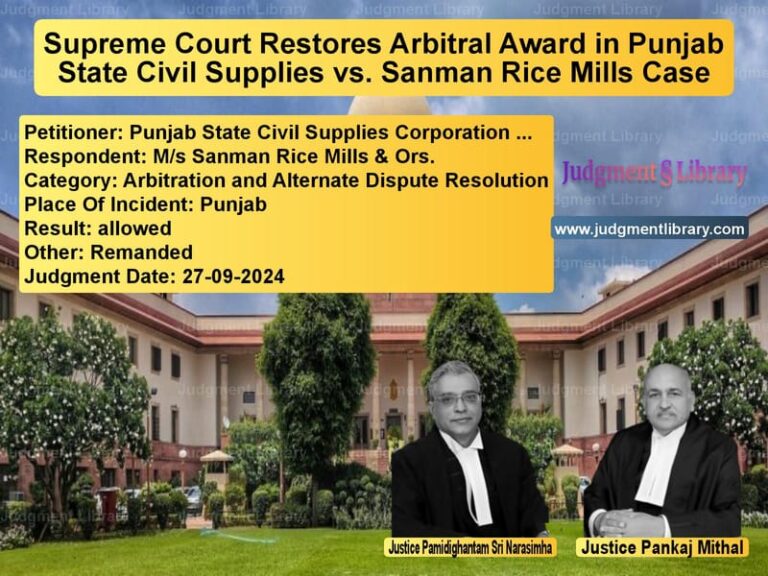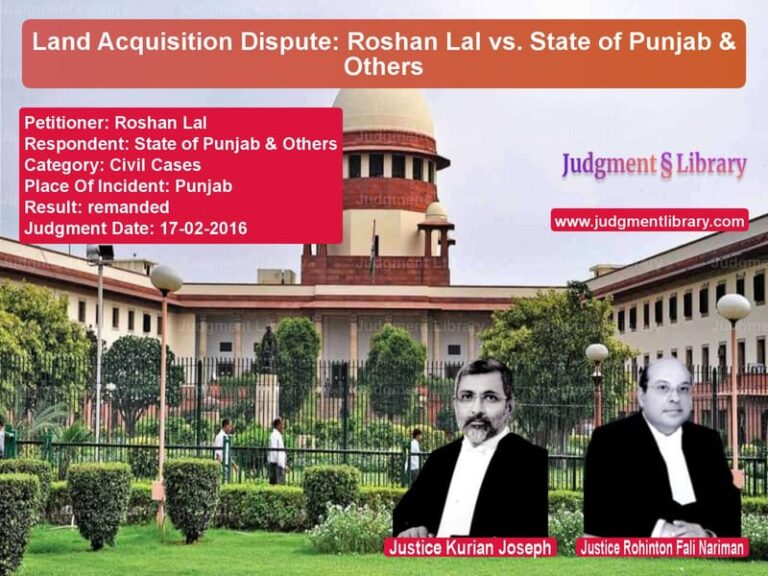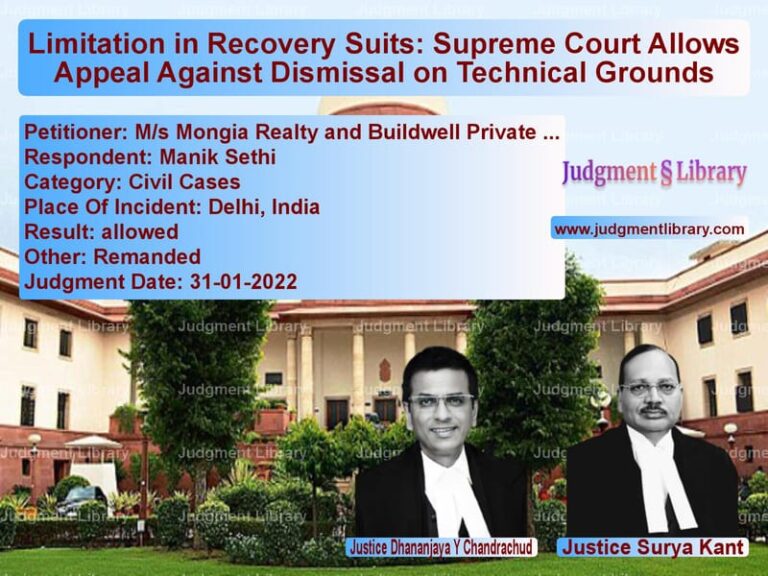Railway Penalty Charges After Delivery: Supreme Court Clarifies Legal Position
In a significant judgment that clarifies the rights and powers of Indian Railways in imposing penalties for misdeclaration of goods, the Supreme Court recently delivered a verdict that has important implications for businesses and transporters across the country. The case involved multiple transport companies challenging penalty demands raised by railway authorities after the delivery of consignments, raising fundamental questions about when and how railways can impose charges for incorrect declarations about goods being transported. This judgment not only resolves a long-standing legal ambiguity but also provides crucial guidance on the interpretation of different sections of the Railways Act, 1989.
The Case Background
The legal dispute began when Indian Railways raised demand notices against several transport companies – Kamakhya Transport Pvt. Ltd., C.M. Traders, and Vinayak Logistics – alleging that they had misdeclared the nature of goods being transported through the railway network. The demands, raised between October 2011 and April 2012, varied in amounts from approximately ₹3 lakhs to over ₹15 lakhs, representing significant financial implications for the transport businesses.
The respondents paid the demanded amounts under protest but subsequently approached the Railway Claims Tribunal in Guwahati seeking refunds. They argued that the demand notices were illegal because they were issued after the delivery of goods, contrary to the provisions of Sections 73 and 74 of the Railways Act, 1989. The transport companies maintained that if railway authorities had concerns about misdeclaration, they should have raised them before releasing the consignments to the recipients.
The Railway Claims Tribunal ruled in favor of the transport companies, directing the railways to refund all amounts with 6% interest per annum. The Tribunal relied heavily on a Gauhati High Court judgment in Union of India v. Megha Technical & Engineers Pvt. Limited, which had held that demands under Section 83 of the Railways Act must be raised before delivery of goods. The Tribunal concluded that railways could not impose punitive charges after delivering goods to consignees without following principles of natural justice.
The Legal Journey Through Courts
Unsatisfied with the Tribunal’s decision, the Union of India representing the railway authorities appealed to the Gauhati High Court. The railways argued that the Tribunal had fundamentally misunderstood the nature of their case. They contended that this was not a case of overloading wagons governed by Section 73, but rather a case of misdeclaration of goods falling under Section 66 of the Railways Act.
The railways maintained that the consignments were booked by declaring items of one category, but upon verification, the loaded items were found to be completely different from what had been declared. This misdeclaration, they argued, entitled them to impose penalties under Section 66, which contains no specific timing requirement for raising demands.
However, the Gauhati High Court dismissed the railways’ appeals and affirmed the Tribunal’s decision. The High Court made several key observations that formed the basis of its ruling. The Court noted that both Section 74 of the Railways Act and Rule 1820 of the Railway Commercial Manual II, 1991, permit recovery of dues before the delivery of goods. The Court also relied on the Supreme Court’s judgment in Jagjit Cotton Textile Mills v. Chief Commercial Superintendent N.R. and Ors., which had held that punitive charges must be raised by railway authorities before delivery is effected.
After examining Sections 73 and 78 of the Railways Act, the High Court concluded that penal charges can only be claimed prior to the delivery of goods, not afterward. This interpretation meant that once railways released consignments to recipients, they lost their right to impose penalties for any alleged violations.
Arguments Before the Supreme Court
When the matter reached the Supreme Court, both parties presented their cases with significant legal implications for railway operations nationwide. The appellant, Union of India, argued that the courts below had erroneously treated the dispute as one dealing with overloading of wagons governed by Section 73. The railways maintained that their case was fundamentally different – it pertained to misdeclaration of goods, which falls under Section 66 of the Railways Act.
The appellant’s key contention was that “the consignments were found to be different, from what had been declared, and, consequently, the appellant imposed a penalty under Section 66 of the Act.” They argued that the High Court’s reliance on Jagjit Cotton Textile was misplaced since that case dealt with overloading and right to lien, whereas the present case involved misdeclaration under Section 66.
The railways also challenged the interpretation that penal charges can only be applied before delivery, arguing that the High Court failed to consider the plain language of Section 83, which permits detainment of goods after delivery in certain circumstances.
The respondents, the transport companies, stood by their position that “since the demand notices were raised after the delivery of goods, Section 66 of the Act would not be applicable, and the Courts below have rightly held in favor of the Respondents.” They relied heavily on the Jagjit Cotton Textile judgment to support their argument that penal charges can only be imposed before delivery of goods.
The Supreme Court’s Analysis
The Supreme Court bench comprising Justice Sanjay Karol and Justice Prashant Kumar Mishra began its analysis by examining the relevant legal provisions. The Court focused particularly on Section 66 of the Railways Act, which deals with the “Power to require statement relating to the description of goods.” The Court reproduced the entire section to understand its comprehensive scope.
Section 66(1) requires the owner or person in charge of goods brought for railway carriage to provide a written statement describing the goods when requested by authorized railway staff. This description enables railway officials to determine the appropriate carriage rate. Section 66(4) specifically addresses situations where the provided statement is “materially false with respect to the description of any goods,” empowering the railway administration to “charge in respect of the carriage of such goods such rate, not exceeding double the highest rate for any class of goods as may be specified by the Central Government.”
The Court made a crucial observation about Section 66: “No reference is made to the stage at which such a charge can be made, i.e., either before or after delivery. Consequently, it can be seen that the legislative intent had to be, to permit levy of charge under this Section, at either stage and not at a specific one.”
This interpretation marked a significant departure from the lower courts’ reasoning, as it recognized that Section 66 contains no timing restriction for imposing charges for misdeclaration.
The Court then examined Sections 73 and 78, which the High Court had relied upon. Section 73 specifically deals with “Punitive charge for overloading a wagon” and explicitly states that such charges can be recovered “before the delivery of the goods.” Similarly, Section 78 grants railways the right to “re-measure, re-weigh or re-classify any consignment” and “re-calculate the freight and other charges” but specifically “before the delivery of the consignment.”
The Supreme Court noted the critical distinction between these provisions: “It is evident from the contents thereof that the demand was raised for misdeclaration by the respondents. No reference has been made to the overloading of wagon, to which Section 73 applies. More so, even the claim petitions do not propose that the demand notices have been for the overloading of wagon. Therefore, in our view, Section 66 applies to the present lis.”
Revisiting the Jagjit Cotton Textile Precedent
A significant part of the Supreme Court’s analysis involved re-examining the interpretation of the Jagjit Cotton Textile judgment, which both the Tribunal and High Court had heavily relied upon. The respondents had quoted paragraph 22 from that judgment: “Again Section 54(1) states that the Railway Administration may impose conditions not inconsistent with the Act or with any general rules made thereunder, ‘with respect to the receiving, forwarding or delivery of any animal or goods’. In our view one such ‘condition’ could be by directing that penal charges could be collected before delivering the goods.”
The Supreme Court offered a fundamentally different reading of this passage: “From a perusal of the above, it is clear that when this Court observed ‘one such ‘condition’ could be by directing that penal charges could be collected before delivering the goods’, it was a suggestion, to explain the conditions that could be imposed by the Railway Administration under Section 54(1). Moreover, the above exposition in Jagjit Cotton Textile (supra), was made in the context of Section 54 only, while the facts of this case pertain to Section 66 of the Act.”
This interpretation clarified that the statement in Jagjit Cotton Textile was illustrative rather than mandatory, and more importantly, that case dealt with Section 54 while the present case involved Section 66.
The Final Judgment and Implications
After comprehensive analysis, the Supreme Court allowed the appeals filed by the Union of India and set aside the Gauhati High Court’s judgment. The Court held that railway authorities were entitled to raise demands under Section 66 for misdeclaration of goods even after delivery, as this section contains no timing restriction unlike Sections 73 and 78.
The Court also addressed the respondents’ challenge to the genuineness of the demand notices, stating: “Furthermore, we are not inclined to accept the submission of the respondents that the demand notices annexed to the petition are not genuine in nature. No evidence has been led to that effect and, more over, the claim petitions are silent on such averments. Therefore, in the absence of evidence to the contrary, we are inclined to find the demand notices to be genuine.”
This judgment has significant implications for both railway authorities and businesses using railway services. For railways, it reaffirms their authority to take action against misdeclaration of goods even after delivery, preventing businesses from evading proper charges by making false declarations. For transporters and businesses, it serves as a reminder of their obligation to accurately declare goods and the potential consequences of misdeclaration, even if discovered after delivery.
The Supreme Court’s decision establishes a clear legal distinction between different types of railway violations and the applicable procedures for each. Overloading cases under Section 73 require pre-delivery action, while misdeclaration cases under Section 66 can be addressed even after goods have been delivered to consignees. This nuanced interpretation ensures that railway authorities have appropriate tools to address different types of violations while maintaining fairness in the process.
The judgment represents an important clarification in railway commercial law, providing much-needed certainty for both railway administration and the business community regarding their rights and obligations in goods transportation. By carefully distinguishing between different sections of the Railways Act and their respective requirements, the Supreme Court has brought legal precision to an area that previously generated significant litigation and uncertainty.
Petitioner Name: Union of India.Respondent Name: M/S Kamakhya Transport Pvt. Ltd. etc..Judgment By: Justice Sanjay Karol, Justice Prashant Kumar Mishra.Place Of Incident: Guwahati.Judgment Date: 04-06-2025.Result: allowed.
Don’t miss out on the full details! Download the complete judgment in PDF format below and gain valuable insights instantly!
Download Judgment: union-of-india-vs-ms-kamakhya-transpo-supreme-court-of-india-judgment-dated-04-06-2025.pdf
Directly Download Judgment: Directly download this Judgment
See all petitions in Contract Disputes
See all petitions in Legal Malpractice
See all petitions in Consumer Rights
See all petitions in Judgment by Sanjay Karol
See all petitions in Judgment by Prashant Kumar Mishra
See all petitions in allowed
See all petitions in supreme court of India judgments June 2025
See all petitions in 2025 judgments
See all posts in Civil Cases Category
See all allowed petitions in Civil Cases Category
See all Dismissed petitions in Civil Cases Category
See all partially allowed petitions in Civil Cases Category







